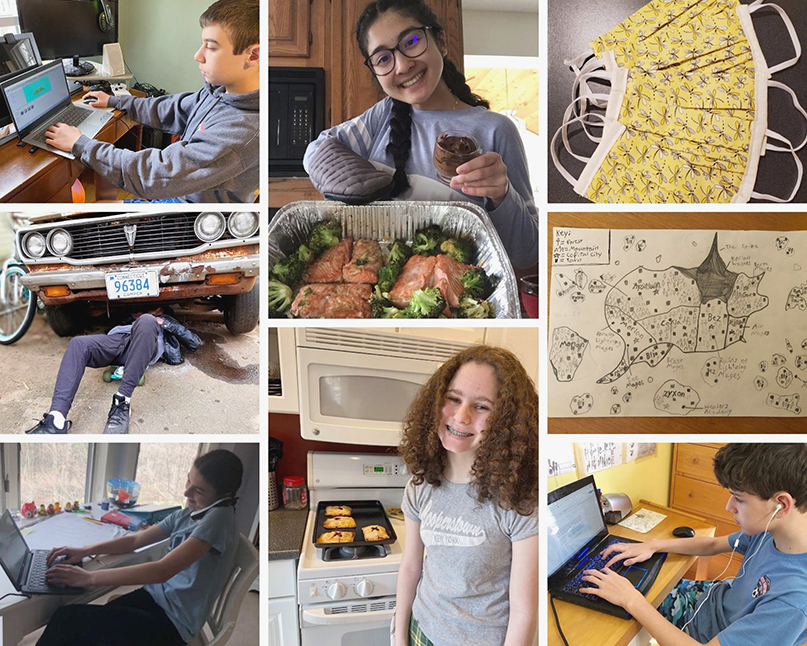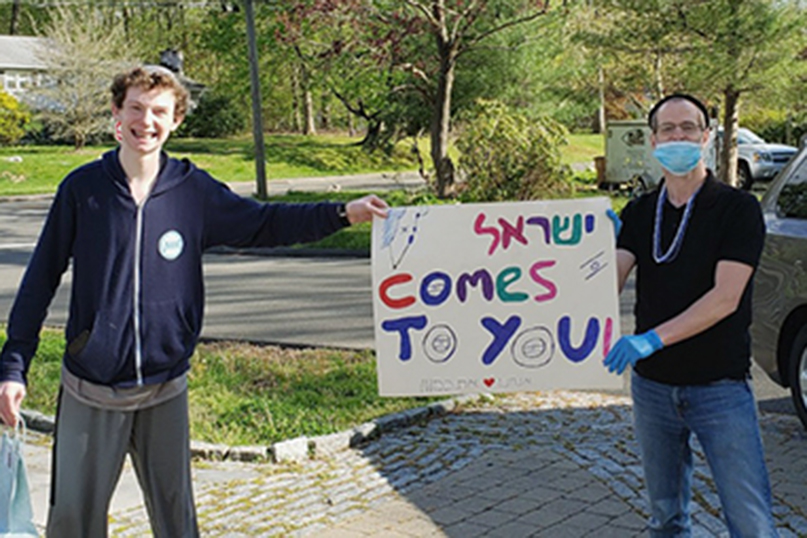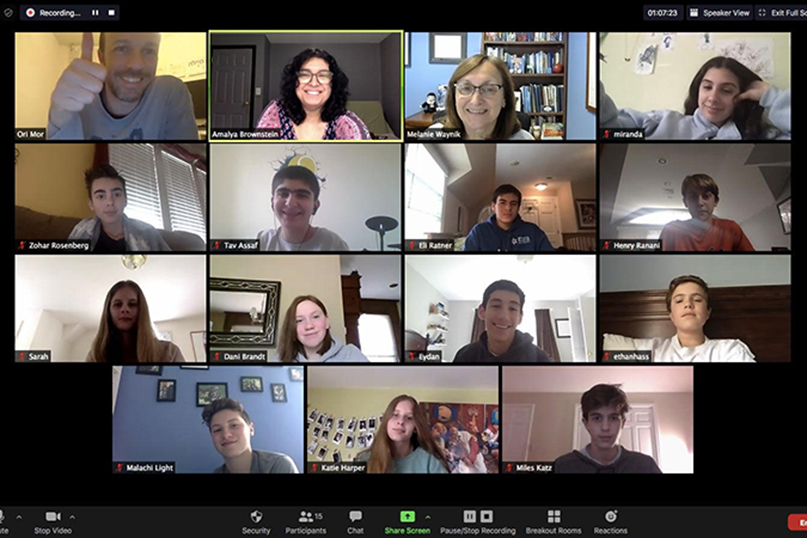
Just as Jewish day schools all across the country were gearing up for their annual eighth-grade trip to Israel, COVID-19 happened – and just like that, the trip of a lifetime turned into no trip at all. Understandably, students were devastated – and school administrators knew there was nothing they could come up with to replace the actual Israel experience. But three Connecticut schools whose trips were among those cancelled came up with creative programs help soften the blow.
IN WEST HARTFORD…
Schechter students take time for passion projects
By Stacey Dresner
WEST HARTFORD – Eighth graders at Solomon Schechter Day School of Greater Hartford (SSDS) were supposed to be in Israel from April 20 through May 6 for the “capstone” experience they have prepared for throughout their day school years.
Instead, due to Covid-19, the seven students spent two weeks at home working solely on “Passion Projects” each delving into a topic that interested them.
The topics included writing a fantasy novel; sewing and donating face masks to first-responders; creating a video game through coding; helping one’s father fix and rebuild a 1977 Toyota Chinook; and researching and interviewing four surgeons about their work. Two student projects dealt with food – one student concentrating on nutrition and making vegan and vegetarian meals for her family for the entire two weeks, and the other honing world-class pastry making skills.

“The projects were incredibly varied,” says Andrea Kasper, SSDS Head of School. “I loved it because, I think in this time when they are not together, particularly for this age group when there’s so many different kind of social pressures, it was good for them to be able to totally dive into something that was uniquely them, with the space to explore on their own and not be told what to do.”
Though the projects came about because the students were not able to go to Israel, Kasper doesn’t think they should be considered a replacement for the Israel trip.
“[Working on passion projects] is an idea that I have really been considering for a long time,” Kasper says. “We’ve played with the idea of independent study options and this was a way to bring it all the way to the fore. They had the opportunity to choose absolutely anything that they are interested in or curious about.”
The students met with Kasper to discuss the ideas for their projects; Kasper then matched the students with mentors – faculty members with skills connected to each project.
Students came up with goals and a work plan, and had to meet – virtually, of course – with their faculty mentors once or twice a week.
“There were guidelines and structure, but it was very loose,” Kasper says. “If we really trust kids and we let them explore their own interests with support, they will do nothing but impress you.”
Kasper says that while the cancellation of the trip to Israel was a disappointment, the goal has been to frame the situation in a more positive light.
“Abrupt changes and disappointments can provide opportunities for new ideas,” she says. “We can hold the disappointments in one hand and find moments of opportunity in the other.”
IN STAMFORD…
Hebrew Academy 8th-graders go Zoom
The 25 eighth-graders who make up this year’s graduating class at Bi-Cultural Hebrew Academy Lower School in Stamford practically had their bags packed for their trip to Israel, when their plans to spend a month trekking through the Jewish state came to a screeching – and heartbreaking – halt.
Just as the class were ready to embark on what has become for the Lower School’s graduating class an eagerly anticipated rite of passage, it became clear that, owing to the rapidly spreading pandemic, the month-long “Israel Experience” trip would have to be cancelled.
Needless to say, the students were devastated. With good reason. For the Lower School’s graduating class, the “Israel Experience” is the capstone of their years at BCHA; a chance for students to strengthen their bond not only to the land of Israel – to their heritage and their people – but also to one another, as they get set to move on to the next stage of life.

BCHA faculty realized that nothing they conjured up would come close to taking the place of actually setting foot on Israel’s holy ground; of traveling through the land’s ancient cities and along its magnificent coastline. Still, they were determined to come up with a viable – and, of course, virtual – “Israel Experience.”
And, so they did.
Conceived and coordinated by BCHA Judaic studies teachers, Morah Elana Friedman and Rabbi Tzachi Posner, the “Israel Zoom Experience” kicked off in early May with a social distancing home visit to each 8th-grade student by Rabbi Ofir and Adi Yarchi, the school’s shlichim (Israeli emissaries) who came bearing Israel-themed gift bags.
Led by tour guide Elli Shashua, the virtual experience began with a Monty Python-like portrayal of a typical encounter in an Israeli shuk and the stereotypically aggressive bargaining which ensued. Elli went on to explain that unlike the parody, the Torah’s first description of buying land was all above board; indeed, Avraham purchased Maarat Hamachpela in Hebron, the first Jewish-owned city in Israel, at full price, refusing any discount.
Though occasionally addressing heavier topics such as the ins and outs of the Arab-Israeli conflict, the group’s primary goal was to engage in entertaining educational activities that mixed fun with fact. Students participated in a scavenger hunt through the sacred Old City of Jerusalem, a practical demonstration of life-saving army techniques, an exploration of Israel’s world of high tech, a Zoom session connecting students with Israeli teens, and, home-made Israeli iced-coffee in hand, a virtual trek up the steps mountain path to Masada where, in celebration of Lag BaOmer, Elli produced a Go-Pro adventure through ancient caves used during the Bar Kochba revolt.
Other BCHA teachers also got in on the fun and learning. During an examination of Southern Israel, BCHA science teacher Christopher Graseck conducted a science lab on salinization and the Dead Sea that gave them an understanding about the importance of water in Israeli policy. And, Ivrit (Hebrew language) teacher Morah Iris led an Israeli Master Chef level cooking class, recreating the popular mid-eastern break-fast dish, shakshuka.
A highlight of the experience were Zoom visits with BCHA’s Banot Sherut volunteers, both past and present. (Banot Sherut come to America to spend the school year educating students about Israeli life and helping them foster a love and appreciation for Israel.)
“Our trip to Israel may not have been what it was supposed to be; nonetheless, given the circumstances, I’m in awe of Morah Elana [Friedman] and Rabbi Tzachi [Posner] for the way in which they conceived and orchestrated a meaningful program for our eighth-grade graduates,” said BCHA Head of School Jackie Herman.
Rabbi Tzachi and Morah Elana summed up the experience, saying, “We would never attempt to actually replace the Israel trip with a Zoom call; it’s simply not possible! Rather, we sought to find solace through uniting as a class and engaging with the history, culture, and land of our people.”
IN WOODBRIDGE…
Ezra Academy students network with Israeli high-tech entre-preneurs
WOODBRIDGE – Ezra Academy’s 12 eighth-grade students would have been nearing the end of their trip to Israel on May 7. Instead, they met virtually with Ori Mor, vice president of research and development at Wi-Charge, a high-tech firm in Rehovot, Israel working on long-range wireless power technology.
“These are not Wi-Charge employees. Not yet at least,” said Mor on Linked-in, posting a photo of his zoom meeting with the Ezra students.
“I had the privilege of helping a few home-isolated kids in Connecticut getting over the boredom kids are experiencing daily due to Covid-19 sanctions,” Mor added. “We spoke about wireless power – how it works and what it is good for… Bright kids. One even guessed correctly – knew how to calculate – how much it costs to charge a phone over an entire year.”
Melanie Waynik, Ezra’s Head of School, said that the meeting between Mor and the 12 eighth-graders tied into both the trip to Israel and the school’s social justice curriculum.

“The eighth-grade social justice curriculum revolves around Israel; what we do is look at innovation and technology and the way that it has been used to make the world a better place,” Waynik said. “We were supposed to go and visit some of those places and meet people who engaged in doing really revolutionary things that change the lives of people. Now the kids are meeting online with these young entrepreneurs that are doing really interesting things.”
While interesting, activities like this, Waynik admitted, are no substitute for a two-week trip to Israel.
“It’s been rough,” Waynik said. “The reality is that the trip to Israel is sort of the culminating experience of nine years of day school education. And a lot of the curriculum in seventh and eighth grade is geared towards that. In seventh grade they do history of Zionism, starting with the first exile from ancient Israel to Babylonia. Then we study migration patterns of Jews across the world and always this longing for Zion.
“Then we go through modern history…the birth of the Zionist movement, and the creation of the state of Israel. And their eighth-grade curriculum is very much engrained in the Israel experience.”
The Zoom meeting with Mor and Wi-Charge was just one of the pieces of the Israel itinerary that they are now carrying out virtually.
The kids will meet several other Israelis on zoom over the next few weeks, including an Israeli typographer/graphic designer who is working on a typeface combining Hebrew and Arabic, creating a text that all Middle Easterners will be able to use.
“We’re trying to do much as we can to provide them with a bit of experience,” Waynik said. “What we have been able to do is at least bring a little bit of what we were going to do in Israel to them.”








 Southern New England Jewish Ledger
Southern New England Jewish Ledger









